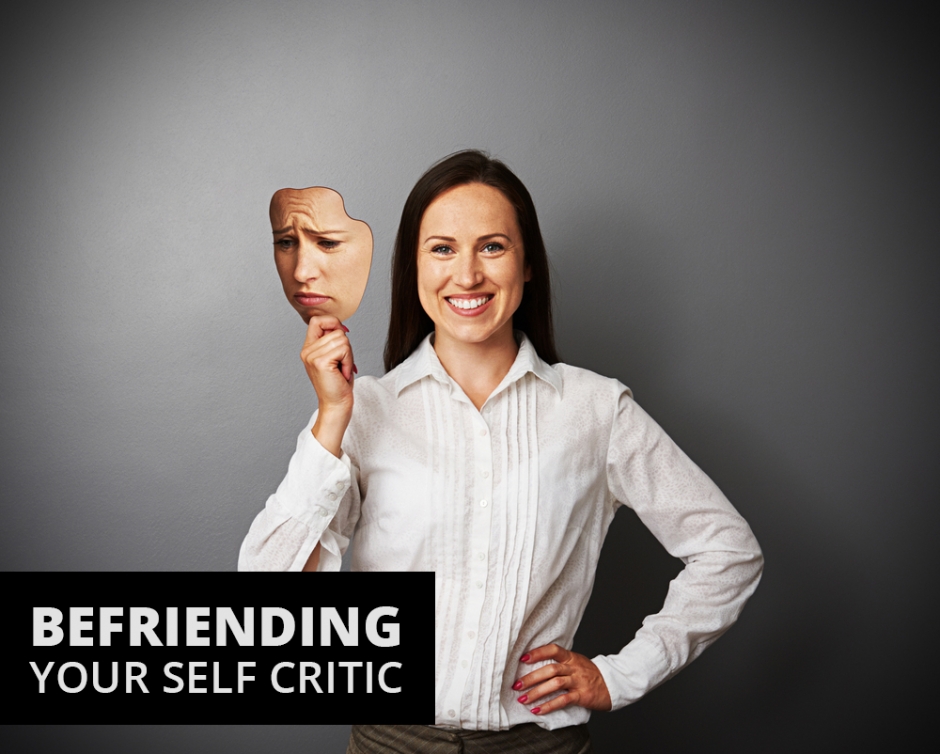Everyone has a self-critic. It is that part of us that is constantly commenting negatively on and condemning what we do; it tells us that we’re not good enough, that we “shouldn’t, oughtn’t or mustn’t” do things with our own authority.
The critical faculty of mind is in itself very useful, but our self-critic is loaded with negative emotions such as self-loathing, shame and contempt, and so the clearness of what might be self reflection is sabotaged by a tirade of put downs.
This results in a closing of our heart and mind, and sentences us to a prison or trance of unworthiness and shame, thwarting our potentials. In vain we repress this voice by force of suppression; Rob Nairn from the Mindfulness Association, backed up by modern neuroscience tells us that “energy follow focus”, meaning that the more we force out this inner voice in fact the more we lay down strong neurological pathways that ironically make it stronger and in reality keep our brains in an anxious state of flight or fight; for this reason it is crucial to find skilful ways of working with it.
Here are 5 stages of working skilfully to befriend your self critic
- Allow your mind to settle, let your thoughts calm, get in touch with your breath and your breathing just as it is, ground yourself by feeling your feet on the floor and your body in your chair and in the room. Take some time to let your sense open
- Bring to mind a time when you have felt the presence of your self critic, let the presence of your self critic build up as if it were external to you, see if you can get a felt sense of its size, colour, face, its embodiment and how it expresses itself to you. Just notice this
- Ask yourself: does my self critic have my best interests at heart, is it helping me to realise my potentials?
- Now look again at your self critic and ask it three questions: what is driving you, what are you frightened of, and how will you know when your work is over? (don’t expect a quick answer, or even an answer)
- Now send your self-critic a message of compassionate well-being such as: may you find release, may that which is driving you find peace, may your work be done and may you move on
Repeat these stage wherever the voice of your self critic looms large: your are practising befriending yourself critic, which is really making greater friends with yourself-makes sense!
Hi, I’m Graeme Armstrong.
I’ve worked as a psychological therapist now for over 18 years.
I’ve worked with young parents to help build up families in Sure Start Children’s Centres in Gateshead, as a counsellor in a Primary Care setting treating depression, anxiety and other mental health problems, as a Core Member of The Senior Clinical Team at Relate Northumberland and Tyneside as a couple counsellor, trainer and supervisor, and counselled ex-offenders in the Supporting Women Around Northumbria (SWAN) Project. I am a Lead Tutor for the Mindfulness Association and a visiting lecturer at the Guidance and Counselling Undergraduate Course at Northumbria University. I am also a trainer for therapist continuing professional development at Jesmond Therapy Centre.
At the heart of my practice lies a passionate belief that although we all experience great pain and distress in our lives, we all have the ability to heal and grow through this pain and find more enriching, creative and satisfying lives. It has been my honour to have guided and helped hundreds of people on their journey do just that.
I have the Relate Certificate in Marital and Couple Counselling and Post Graduate Diplomas in Couple Therapy, Systemic Therapy and Studies in Mindfulness, allowing me to understand and get to the heart of personal and relationship issues.
I have delivered over 20 Modules for the Mindfulness Association and have been part of several Mindfulness Association Retreats at Samye Ling and at Holy Isle, promoting secular mindfulness throughout the U.K. I started meditating in 1988 and then developed my practice by attending a Mindfulness Based Stress Reduction course in 2010.
I work according to the Ethical Framework of the British Association of Counselling and Psychotherapy (BACP)





